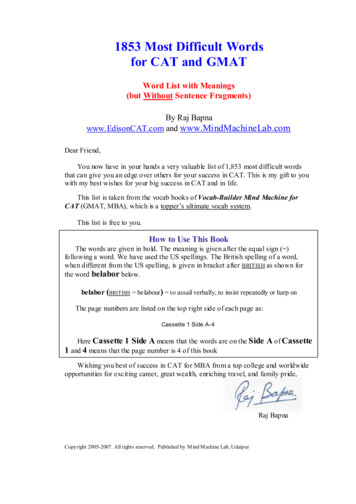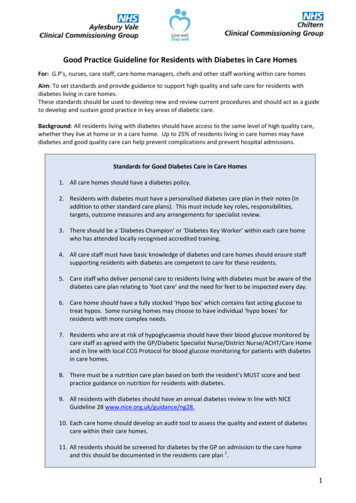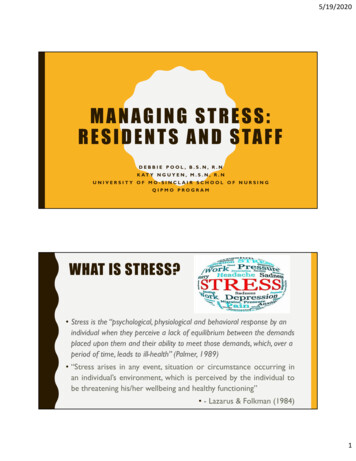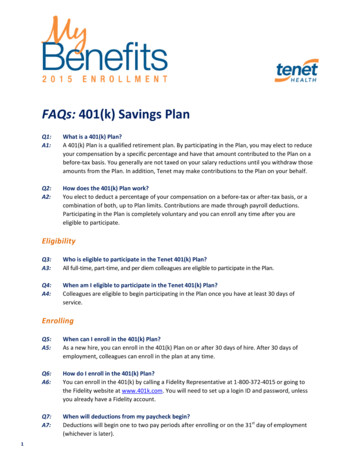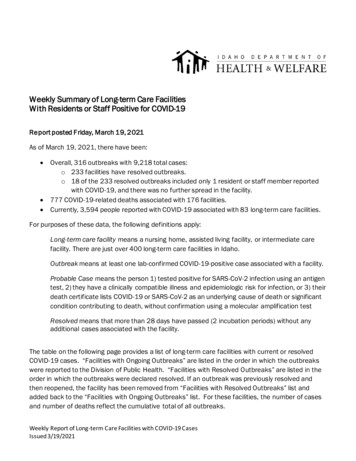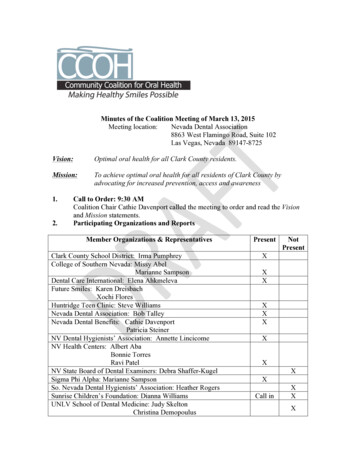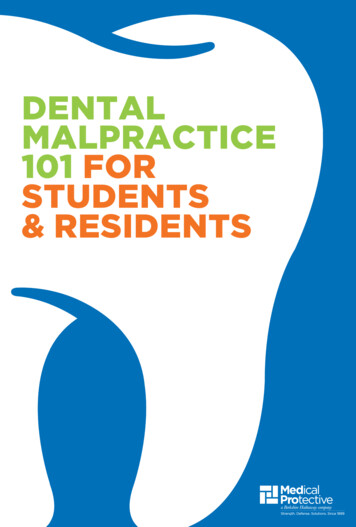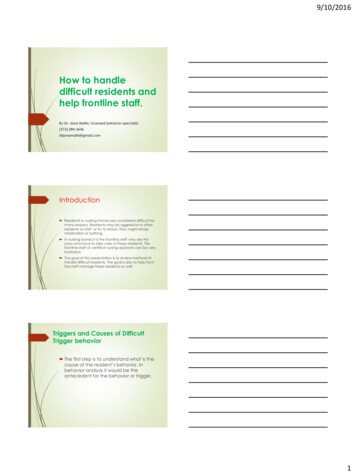
Transcription
9/10/2016How to handledifficult residents andhelp frontline staff.By Dr. Jana Mallis, Licensed behavior specialist.(215) 284-3646drjanamallis@gmail.comIntroduction Residents in nursing homes are considered difficult formany reasons. Residents may be aggressive to otherresidents or staff or try to elope. They might refusemedication or bathing. In nursing homes it is the frontline staff who are theones who have to take care of these residents. Thefrontline staff of certified nursing assistants can be veryfrustrated. The goal of this presentation is to review methods tohandle difficult residents. The goal is also to help frontline staff manage these residents as well.Triggers and Causes of DifficultTrigger behavior The first step is to understand what is thecause of the resident’s behavior. Inbehavior analysis it would be theantecedent for the behavior or trigger.1
9/10/2016Rule out medical conditions Such as UTI’s. UTI’s are known to cause reactions in theelderly such as disorientation. Other medical conditions such as delirium should beruled out. Is the resident demonstrating aggressive behavior orpsychiatric behavior due to a medical condition postsurgery. Treat the medical condition and see if thesymptoms change.Is there Dementia? Is there a cognitive change. Test fordementia to see if baseline changed.There could be confusion due tocognitive loss and the resident may bemaking associations based on believingpeople they see are relatives or haveother attributes based on past history.Be Proactive and avertcrises. Residents who are in close proximity to other residentswill become agitated. Taking residents out through anexit and they are too close to other residents oftenyields the same result. If a resident has trouble goingpast another group of residents in a tight space,prepare in advance and change the environment tomeet the needs of the resident. This will avert a crisis.2
9/10/2016History repeats itself If there is a history of aggressive behavior to familymembers before entering a nursing home. It ispredictable that history repeats itself. Some residents cannot be managed at home and aretoo aggressive for their families. This information will not always be forthcoming.Sometimes social work can interview family memberswho will tell them what happened at home. It isimportant to use this information to be prepared inadvanceUnderstanding resident’s lifeand current patterns. Is there a history of occupation or former past time inwhich the resident stays up all night? Does resident try to catch a bus home? It is important to know past history of the resident. Withdementia, they might be repeating a previous patternand there can be a harmless intervention for it.Techniques and Strategies forhandling aggressive residents Tone of Voice: Approach Keeping safe distance Make a decision that you are the best person for thatresident Walking away and coming back especially withdementia Get away from resident while aggressive3
9/10/2016Tone of Voice Tone of Voice: You set the tone. If youare angry or upset residents will pick upon it and become more agitated.Always talk calmly and quietly.Approach Approaching from behind is not a goodway to approach a resident because itmay get them upset or startled, or evenparanoid. Approach from the side or face to face.Exit Plan Keep safe distances and be aware of available exits. Always allow enough space to get away and not bebacked into a corner. Always be near an exit. If youare cornered in a room use call bell or yell to otherstaff to come in and distract the resident.4
9/10/2016Person with most rapportinvolved. Decide who is the best person for a resident and whohas the most rapport with a resident. Whoever has the most rapport with the resident shouldintervene.Residents with dementia Walking away and coming back especially withdementia. They forget the interaction and give you a fresh start.Safety Get away from resident while aggressive. In a crisisand being pursued by a resident, the safety ofresident and staff is of utmost importance. Always best to get away from the resident who isaggressive and let another staff member intervene. If there is physical contact the goal is to get away andkeep resident safe as well as staff. Safety techniquescan be utilized to get out of holds such as wrist grab,choking, hair pulling and biting.5
9/10/2016You won’t become friends ina crisis. Become friendly with residents that are known to bedifficult. It will not be possible to make friends in a crisis.If you have already established a relationship with theresident, you will be able to help when there is a crisis.Say Hello and try to have a brief conversation of apositive nature with difficult residents on a regularbasis before there is a crisis.Evaluate psychoactivemedication Evaluate by psychiatrist or nurse practitioner forchange in medications. If there is a Gradual DoseReduction Meeting to evaluate medications ofresidents make sure the resident is on priority to bereviewedLearn safety techniques Teach basic safety techniques to staff so they can getout of crisis’s in the safest manner for resident andstaff. Safety techniques will be reviewed in session ifthere is time. How to get out of chokehold wrist grab, hair pull,bites.6
9/10/2016Suicidal ideation How to recognize suicidal intention: “I want to diestatements” vs Do you have a Plan? Don’t be afraid to ask. Put it off techniques: guilt orunfinished businessReview incident withresident If resident is cognitively intact review how to handlethe situation better in the future. Suggest that residenttalk about feelings versus acting on them. There maybe a person that resident can be called on whenupset.Accepting the past history A resident may be sun downing at a particular timeevery day and schedule can be adjusted to avoidany issues at that time. For example a resident withdementia who used to have a night job and stays upall night or a resident who believes she is catching abus home at a certain hour. A staff person might beable to say that the bus has been delayed till themorning. If there can be an intervention that buystime, it will be very helpful to managing the resident. When possible allow for differences based on pasthistory that can be accommodated.7
9/10/2016Don’t argue with dementia Don’t argue or try to convince a resident withdementia of something when they are completely seton information based on regressing to an earlier time. Example: An eighty year old woman wants to call hermother or take care of her baby. Do not tell her thather mother is dead. Don’t argue that her baby isgrown. Maybe give her a doll to take care of.How to Help Frontline Staff withDifficult Residents It is important to understand the needs of front linestaff. The certified nursing assistants need to understandwhy residents may be challenging.Help Staff understand Explain to staff what is the difference betweenDementia vs psychiatric disorders: hallucinations,delusions .8
9/10/2016Medical causes Explain to staff that there may be medical reasons fora client’s behavior such as UTI and needing antibiotic.Once the UTI is cleared up, the resident may no longerSee previous section Review previous section with staff on handling difficultresidentsValidate Staff Validate the staff member for trying to help in achallenging situation. Sometimes the staff personwants to vent. They may be confused about whythere is difficult behavior in a nursing home. Oftenthey might say that they did not know they wereworking in a psychiatric hospital and they feeluntrained and unprepared. Mention to the staffperson that you will help them have the tools theyneed to help their residents. It might help to explainthat there are no long term psychiatric hospitals andthat elderly even with psychiatric problems go tonursing homes.9
9/10/2016Everyone needs a pointperson Have a point person that can be contacted foradvice by the C.N.A.’s.Staff Appreciation Most importantly this is a time to show appreciation forthe frontline staff. When they feel appreciated, theyare likely to go the extra mile and be more successfulin their interactions with clients. Take the time to haveeach person speak.Stress Management for theStaff Address Stress Management with the staff. Ask eachperson to talk about how they handle stress. Do avisualization relaxation exercise with them. Contactme about these exercises I designed. Example: Play calm music, ask them to see themselvesin a beautiful place of their choice. Tell them to seethemselves, happy with their goals met, and whateverthey would like to have in their life. Ask them to closetheir eyes and imagine it in much detail.10
9/10/2016Morale Boost Improve morale: Provide snacks, refreshments andpossibly a small gift from the dollar store for them tochoose. When staff is confronted with difficult residents theymay feel alone and need a boost in motivation. Amajor goal to this presentation is to help boost the staffmorale so they can feel positive and supported whenthey help with difficult residents.Thank you Dr. Jana Mallis is a licensed behavior specialist. She hashad many years of experience working in behavioralhealth in nursing homes. She does speakingengagements on the topics of handling difficult residentsand helping frontline staff. Specialty in stressmanagement, Relationships, Anxiety, Depression. She has been the counselor of the Roxborough NursingSchool for over ten years and has contracts with severalbehavioral health companies. Dr. Jana Mallis is also on the Willow Grove NAACPexecutive committee and chairperson of their banquets.She is the founder of Golden Heart Group and GoldenHeart Award Banquet for Unsung Heroes in theCommunity, going into 22nd year. Also on the Citizen’sAdvisory Board with Phila Probation and Parole and SafeStreets project from Montgomery County DA office.Contact Information By Dr. Jana Mallis Licensed behavior specialist. drjanamallis@gmail.com (215) 284-364611
health in nursing homes. She does speaking engagements on the topics of handling difficult residents and helping frontline staff. Specialty in stress management, Relationships, Anxiety, Depression. She has been the counselor of the Roxborough Nursing School for over ten years and has contracts with several behavioral health companies. Dr.File Size: 358KB
